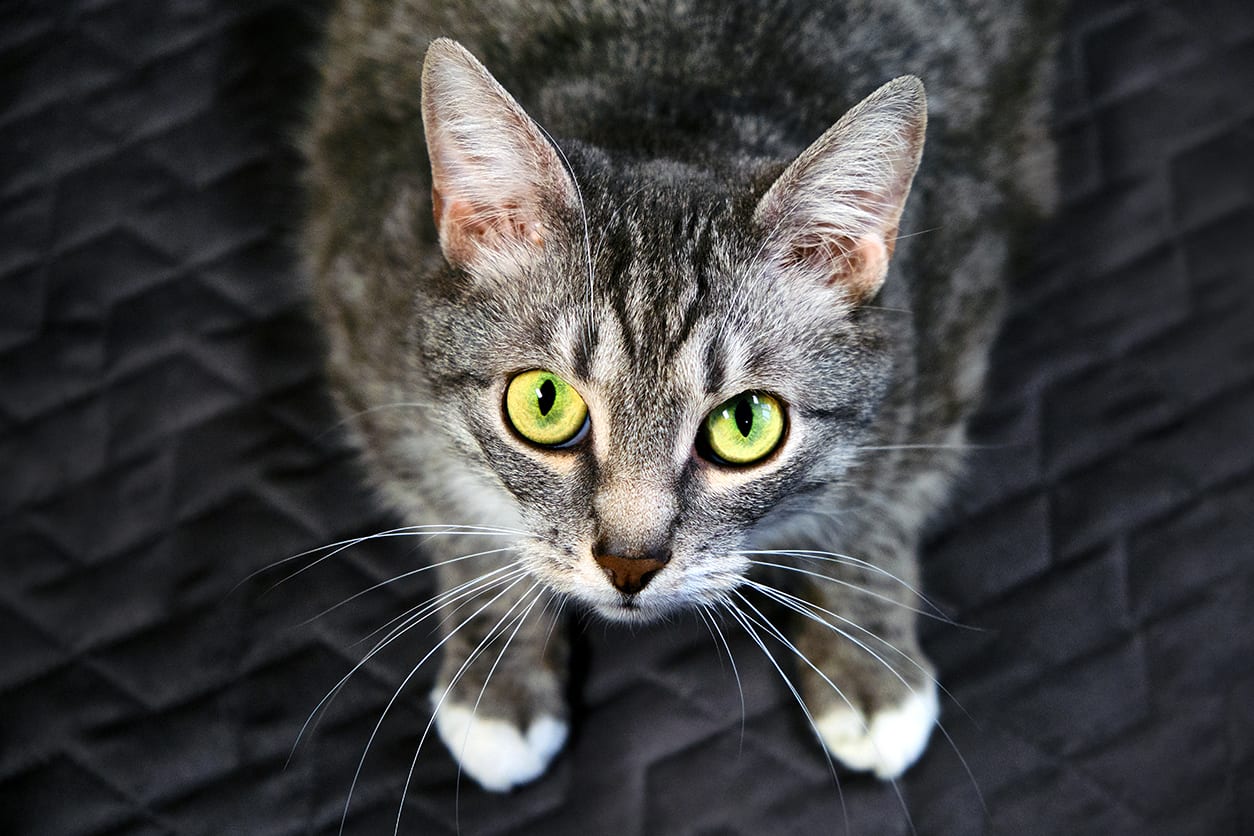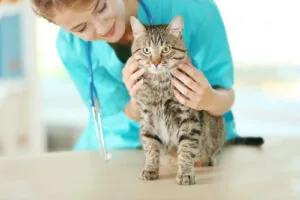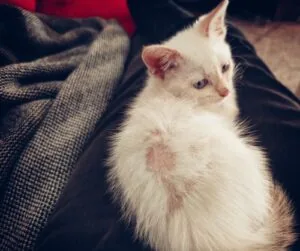Common Cat Problems and Solutions

1. Cat is scratching the furniture, even though we have a scratching post.
When selecting a scratching post for your cat, make sure it is heavy enough that it will not move when your cat begins to scratch. Vertical scratching posts tend to be “top heavy” and it will move when your cat begins to scratch. They don’t like this and will find a heavier object, such as your furniture, to use as their post. Whichever post you do choose, vertical or horizontal, it would be best to purchase a product called, “Feliscratch.” This product is a pheromone that is applied to the scratching post. Feliscratch is a pheromone and your cat will be drawn to the scratching post. This is positive reinforcement and this will condition your cat use the scratching post. The change from the furniture to the scratching post will not happen overnight. When the cat does attempt to scratch your furniture, you need to let the cat know that the furniture is now off limits. You can spray the cat with water or use a loud rattle made from a plastic soda bottle and marbles to stop the negative behavior. The noise/water will distract your cat from scratching the furniture and letting them know that the furniture is off limits. After distracting them, calmly move your cat to the scratching post to let them know that the post is for scratching.
2. Cat is coughing up hairballs.
Depending on the breed of the cat, the longer the fur, the more often it should be combed. Daily combing will help in minimizing the amount of fur the cat will ingest. To help with hairballs, there is a recommended product called Laxaire/Laxatone. This is a gel that comes in a tube and many cats like the taste the product. Give your cat a teaspoon of the gel daily and it will help with the passing of the hairball.
3. Cat meows loudly in the night or the early morning, waking my family.
- If you have a female cat, make sure she is spayed. This could be an indication that she is in heat and is crying out for a mate.
- If you have an older cat that is crying out during the night, it may be age and health related.
-
- For some older cats, senility might be setting in and they are adjusting to the environment.
- Due to their age, the cats can have heart, thyroid, and diabetic issues, causing your cat to go blind.
- Your cat could be uncomfortable due to an underlying illness or arthritis.
- With arthritis, your cat would be constantly moving from one area location to another. Trying to get comfortable. Their crying out could be one way for them to relieve their stress from the pain.
- Finally, it could be that your cat is hungry. Try leaving some canned food out overnight. Try this for a couple of weeks to see if this makes a difference.
4. Cat keeps bringing dead mice or birds into the house.
We recommend that cats stay indoors, but if they do go outside, make sure they are on flea/tick prevention. When your cat brings bird and mice to your doorstep, they are bringing you presents to show you how much they love you. Say, “thank you,” and then throw that present away.
5. Cat has accidents outside the litter box.
There are couple things that can cause a problem of the accidents.
- If the cat is in the litter box and then urinating or defecating outside the litter box. You should get a larger litter box, one with higher sides, or a covered litterbox. Some cats don’t like to squat, or they are suffering from arthritis when they are using the litterbox.
- If you have multiple cats in the house, you will want one litter box per cat +1 and the litterboxes should be in different areas of the house. This will help alleviate the problems of the dominant cat scaring the other cats from using the litterbox.
- Try not to place the litterboxes near wash machines, dryers, furnaces, etc. These noises startle the cat and they are more likely avoid the area where the litter pans are located.
- If these options do not work for your cat, then the next option is to see if your can has any medical issues. This requires you to make an appointment with your veterinarian.
6. Cat vomits after eating.
There are couple things that can cause a problem of the accidents.
- If the cat is in the litter box and then urinating or defecating outside the litter box. You should get a larger litter box, one with higher sides, or a covered litterbox. Some cats don’t like to squat, or they are suffering from arthritis when they are using the litterbox.
- If you have multiple cats in the house, you will want one litter box per cat +1 and the litterboxes should be in different areas of the house. This will help alleviate the problems of the dominant cat scaring the other cats from using the litterbox.
- Try not to place the litterboxes near wash machines, dryers, furnaces, etc. These noises startle the cat and they are more likely avoid the area where the litter pans are located.
- If these options do not work for your cat, then the next option is to see if your can has any medical issues. This requires you to make an appointment with your veterinarian.
7. Cat is aggressive towards family members or other pets.
- Usually this is called misplaced aggression the cat prefers to be left alone. When they are in a household with another animal, the cat sees this as a threat and would lash out at anyone that is bothering them. One of the things you can do is to separate them in different areas of the home.
- You can use a product called Feliway with your cat. Feliway is a cat pheromone that helps alleviate the stressors in the home. You can purchase Feliway as sprays and diffusers for the home.
- Composure Pro is another product that can be given to your cat to calm their anxiety. Composure Pro is an herbal treat that can be given to your cat.
- Medicating your cat would be final option. This will require your veterinarian to prescribe anti-anxiety medication for your cat.
- Finally, your cat might be in pain and it is their way to tell other people and animals to leave them alone. We suggest that you make an appointment with your veterinarian to see if there are options to help with your cats’ pain.
8. Cat seems to be itching or scratching itself.
- The first thing is to see if your cat has fleas. Cats are constantly grooming themselves and they will eat the fleas, so it might be difficult for you to see the fleas. Using a flea comb can help find fleas or flea dirt.
- If your cat is constantly scratching it’s ears, they might have an infestation of ear mites. These are microscopic parasites that live in the ears and causes a lot of itching. Signs of ear mites is black debris inside their ears. Having a veterinarian clean the ears will help with the scratching.
- If your cat has multiple sores, hair loss, and little scabs, they might have an allergy to either fleas, grass, dust, or food.
9. Cat whines for food when people are eating.
- Feed the cat at the same time as you are having your meal.
- Stop feeding the cat from the kitchen table when eating.
- If first two options don’t work, place the cat in a separate room until after the meal.
10. Cat scratches people while playing.
- When cats play, they can get very aggressive and begin to bite. Do not use your fingers, hands, or feet to play with them. Use toys instead. If your cat is starting to bite, give a little sharp cry like a kitten. As cats begin to explore their environment, they will begin to bite everything. When you watch any video of kittens playing, notice that when the aggressor kitten begins to bite, the other kitten starts to cry. This is a notification from the kitten to the aggressor that the bite is painful, and that the aggressor needs to stop.
- Cats are not small dogs. Do not “roughhouse” with them, you are only teaching them to be aggressive.
Share This Post
Recent Posts
About Dyer Animal Clinic
We are a place where pets and their people can feel at home. It's a place where wellness is maintained and supported from the time they’re newborns through their golden years.






